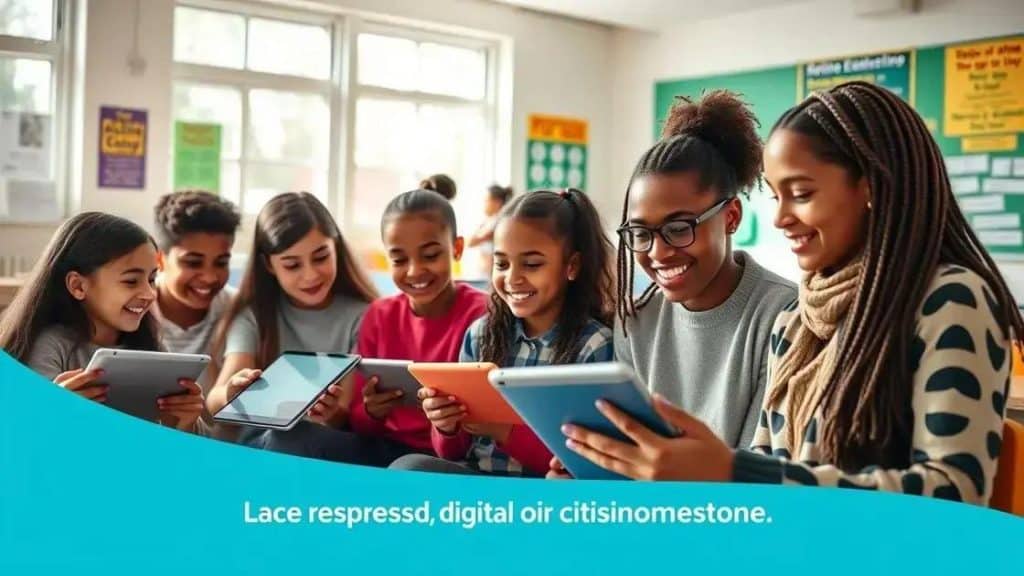Digital citizenship curriculum importance in modern education

Anúncios
Digital citizenship curriculum importance lies in equipping students with essential skills for responsible online engagement, including online safety, communication, and critical thinking, preparing them for the challenges of the digital age.
Digital citizenship curriculum importance should not be underestimated. In today’s tech-centric world, guiding students to engage responsibly online is essential. How prepared are our students for this digital frontier?
Anúncios
Understanding digital citizenship
Understanding digital citizenship is critical in our technology-driven world. It involves teaching individuals how to engage respectfully and responsibly online. As our lives become more intertwined with the internet, the need for sound digital practices grows.
Digital citizenship is not just about technology skills; it’s about ethics and responsibility. What does it mean to be a good digital citizen? It encompasses understanding how to communicate appropriately, protect privacy, and navigate online spaces safely.
Anúncios
The key components of digital citizenship
To grasp the full concept of digital citizenship, it’s essential to recognize several core components:
- Digital communication: Understanding how to interact online, from emails to social media, is vital.
- Digital literacy: Knowing how to find, evaluate, and use information correctly ensures responsible engagement.
- Online safety: Keeping personal information private and recognizing threats like cyberbullying are crucial.
- Ethics and responsibility: Acknowledging the impact of online behavior on oneself and others is necessary for thoughtful participation.
In addition to these components, digital citizenship encourages critical thinking. Users must assess the reliability of online sources and navigate complex information landscapes effectively. Recognizing misinformation is a significant skill in today’s media environment.
Digital citizens contribute positively to their communities by sharing knowledge and helping others. They engage in discussions that promote understanding and respect. Moreover, instilling a sense of digital responsibility prepares students to face the challenges of the online world with confidence.
Training students in these areas creates a more responsible digital community. Integrating digital citizenship into education empowers the next generation to thrive online while being mindful of their roles as active participants in society.
Core components of a digital citizenship curriculum

Understanding the core components of a digital citizenship curriculum is vital for effective education. These components shape how students navigate the digital world responsibly. As technology evolves, so must the way we educate our youth.
There are several key elements to consider. Each component plays a role in helping students become informed, compassionate, and responsible online users. By focusing on these areas, educators can create a curriculum that meets the needs of today’s digital learners.
Essential Elements of Digital Citizenship
Here are the essential elements that should be included:
- Digital Communication: Teaching students how to communicate effectively and respectfully online is crucial. This includes understanding tone, language, and the impact of their words.
- Digital Literacy: Students need the ability to find, evaluate, and use information online. This skill ensures they can discern credible sources from unreliable ones.
- Online Safety: Understanding the importance of protecting personal information and knowing how to respond to online threats are essential for building safe online habits.
- Digital Etiquette: Students should learn the appropriate behavior when interacting online. This includes being respectful and recognizing the responsibilities that come with sharing content.
Moreover, integrating critical thinking into the curriculum helps students analyze online content meaningfully. They should learn how to assess information critically to avoid falling for misleading narratives.
Equipping students with knowledge about their digital footprint empowers them to make informed decisions. Understanding the consequences of their actions online can encourage responsible engagement in digital spaces.
Through discussions and real-life scenarios, educators can help students navigate complex online interactions. For example, exploring case studies about cyberbullying can highlight the importance of empathy and respect in the digital environment. By emphasizing essential components, the curriculum fosters a culture of respect and responsibility.
Benefits of teaching digital citizenship
Teaching digital citizenship offers numerous benefits that extend beyond simple internet usage. In today’s world, where technology is ever-present, understanding digital citizenship prepares students to engage responsibly online. It equips them with the skills needed to navigate the complexities of the digital space.
One significant benefit is the promotion of online safety. Students learn how to protect their personal information, recognize potential threats, and understand how to behave appropriately in online interactions. Moreover, this knowledge fosters a safe learning environment, both in and out of the classroom.
Enhanced Communication Skills
By teaching digital citizenship, students also enhance their communication skills. They learn how to express themselves clearly and respectfully in various digital formats. This ability to communicate effectively is essential for their future personal and professional lives.
- Respectful interactions: Students develop the ability to engage respectfully with others online.
- Cultural sensitivity: Awareness of global communities helps them navigate diverse perspectives.
- Conflict resolution: They learn how to address disagreements online constructively.
Furthermore, digital citizenship education fosters critical thinking. Students are taught to analyze information and assess the credibility of sources. This skill is vital in a world where misinformation spreads rapidly. A critical mindset enables students to draw informed conclusions and make better decisions.
Encouraging responsible behavior online creates a positive digital culture. When students understand the implications of their actions, they are more likely to engage with integrity. This shift can lead to increased empathy and support within digital communities.
Challenges in implementing digital citizenship education

Implementing digital citizenship education presents several challenges that educators must navigate. While the need for such education is clear, various factors can hinder effective execution. Understanding these challenges is essential for creating a successful program.
One primary challenge is the ever-changing nature of technology. With new platforms and tools emerging regularly, keeping the curriculum updated can be difficult. Educators must continuously seek to learn about new technologies to ensure their lessons remain relevant.
Limited Resources
Another significant challenge involves limited resources. Many schools may not have adequate funding or access to technology. This lack of resources can impact the ability to teach students effectively.
- Insufficient training: Teachers may need more training to teach digital citizenship effectively.
- Outdated technology: Access to old devices can hinder engaging instruction.
- Lack of curriculum materials: Many educators struggle to find suitable materials that fit their curriculum standards.
In addition, varying levels of student engagement can pose a challenge. Not all students may see the value in learning about digital citizenship. Some may view it as an unnecessary topic. To address this, teachers need to connect lessons to students’ interests and everyday online experiences.
Furthermore, parental involvement is crucial. Without support from parents, reinforcing the lessons at home becomes challenging. Educators can benefit from engaging parents in discussions about digital citizenship to create a solid support system.
In conclusion, teaching digital citizenship is essential in today’s technology-driven world. Despite the challenges of implementation, the benefits far outweigh the obstacles. By fostering a safe and responsible online environment, educators can prepare students to thrive in digital spaces. Students acquire vital skills such as online safety, effective communication, and critical thinking. With strong support from educators and parents, we can cultivate a generation of informed digital citizens who engage positively with technology.
FAQ – Frequently Asked Questions about Digital Citizenship Education
What is digital citizenship?
Digital citizenship refers to the responsible use of technology and the internet, including understanding online safety, ethics, and effective communication.
Why is teaching digital citizenship important?
It equips students with the necessary skills to navigate the digital world safely, enhancing their online safety, communication, and critical thinking.
What challenges do educators face in teaching digital citizenship?
Challenges include keeping up with rapidly changing technology, limited resources, and varying levels of student engagement.
How can parents support digital citizenship education?
Parents can reinforce lessons learned at school by discussing online safety and responsible behavior with their children at home.





